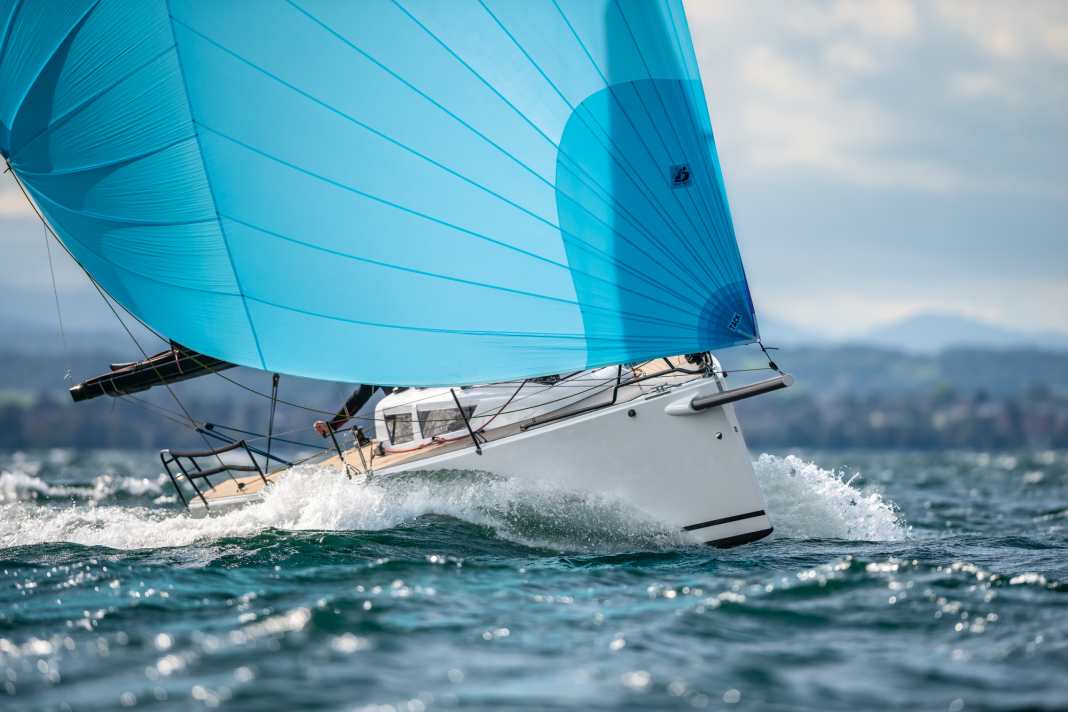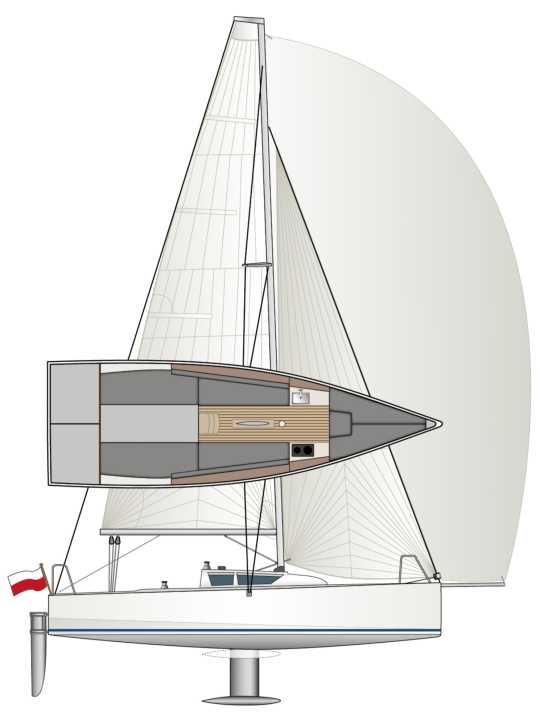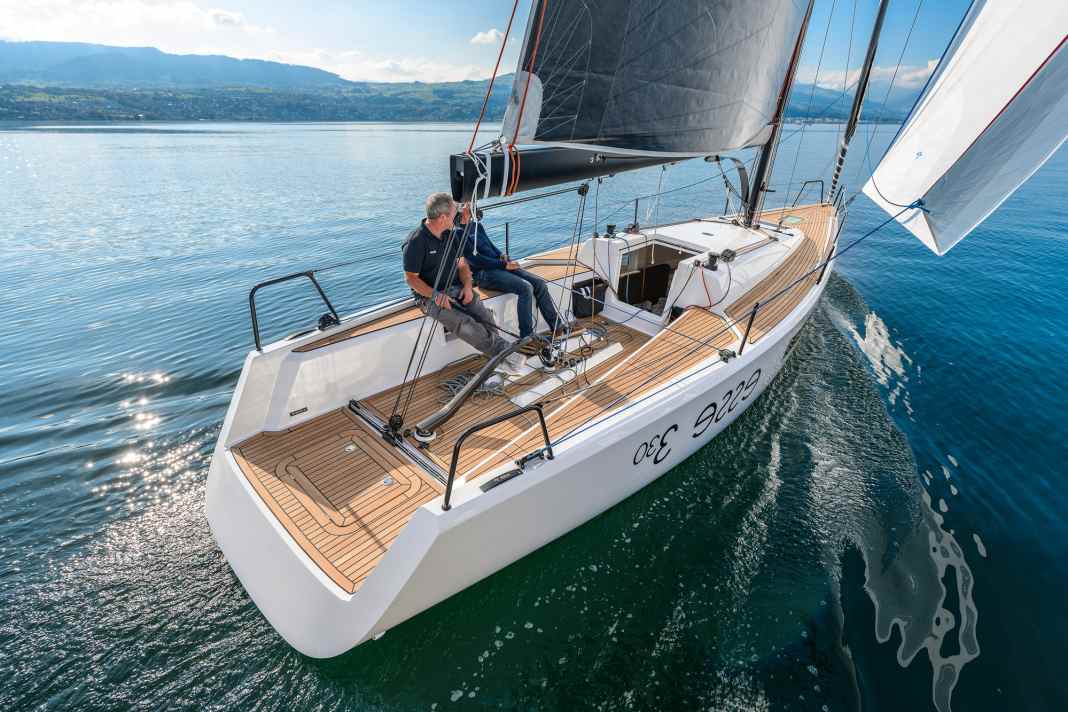N'Fun 30: Versatile weekender with an attractive entry-level price in the test
Michael Good
· 28.05.2025






The basis of this boat was already presented once in the test, in issue 19/2013 under the name NH Fun 30. Since then, a lot has happened around it. In 2020, the sporty weekender came back onto the market as a complete overhaul under the slightly different name N'Fun 30.
This might also interest you:
Marek Stanczyk, an internationally successful match race sailor and boat builder, is behind the project. He devised the concept together with a German partner and realised it at the Nautiner shipyard in Gizycko, Poland. However, with only modest success at first: only two units of the NH Fun 30 were built. In addition, there were probably quality problems. The co-operation broke down.
More than just an update
But giving up is not an option for Marek Stanczyk. He has secured the rights and the moulds, rethought the concept on his own initiative and implemented it from scratch. Visually and at first glance, the differences in the boat remain manageable. Rather, the yacht builders in Poland have improved the details, worked out several sensible variants and generally honed the quality. The boat therefore now presents itself less as a mere facelift and more as a completely new edition - reason enough to put it back on the YACHT test bench.
Lake Constance is at its best for this purpose. A gusty westerly wind is blowing off Friedrichshafen at between 15 and 25 knots. Shipyard manager Stanczyk therefore immediately ties in the second reef, which turns out to be overly cautious en route. With the short overlapping genoa and the clearly too small mainsail area, the boat initially behaves unpleasantly leeward and is difficult to keep on course. However, the efficient traveller on the cockpit floor, the powerful backstay adjustment and the mainsheet control with coarse and fine trim allow more precise fine-tuning. When reasonably well trimmed, the N'Fun 30 marches upwind at 6.2 knots and tacks at an angle of 80 degrees. That's pretty good.
Measured values of the N'Fun 30




Nevertheless, it is decided on board to reef out the mainsail for a second test cross. Unfortunately, this was not to happen: On the way back under gennaker, the boom for the backstay breaks off at the top of the mast - the forces from the additional 85 square metre sail, which is pulled up to the top of the mast, are too high. Before that, however, the N'Fun 30 shows her spirited side once again: the rather slender Polish sailor logs a solid 11 knots of speed on a beam reach of around 110 degrees.
With a backstay that can no longer be used, the strong wind test on Lake Constance is over for the time being. Nevertheless, enough impressions remain to be able to categorise the sailing characteristics of the design by Eugeniusz Ginter from Poland. The boat undoubtedly has considerable performance potential, it sails comparatively stiffly, can go upwind well and goes smoothly through the waves. The well thought-out cockpit layout is just as suitable for a well-practised regatta team as it is for family crews or single-handed sailors on a short trip after work.
Options en masse
What characterises the N'Fun 30 concept in particular is its unusual versatility with a large number of possible options. The customer must decide whether he wants a single or two rudder blades and whether these should be permanently installed or attached to the stern. All conceivable versions can be combined with a tiller or with one or two steering wheels. A hydraulic lifting keel is standard, but is offered in two versions with different draughts. The boat is also available with a fixed keel, but this requires the hull to be reinforced with additional stringers and floor cradles.
There are also numerous alternatives for motorisation, from aft-mounted outboard motors to shaft motors and built-in engines. All drive variants are also available as combustion engines or electric drives. The buyer can even have a say in the construction method. As standard, the hull and deck of the N'Fun 30 are laminated as GRP sandwich constructions with a foam core. For an extra charge, the structure can also be built using the vacuum infusion process.
The standard aluminium rig from a manufacturer in Poland is clearly too soft, the profile is too thin - this was one of the findings of the test. Shipyard manager Marek Stanczyk realises this and is now looking for alternatives. The boat can currently also be ordered with a higher-quality and stiffer rig from Seldén, which is definitely recommended. A self-tacking jib is also available as an alternative to the short overlapping genoa.
Also for the weekend
Below deck, the test boat surprises with an unexpectedly cosy and homely interior. Adults sleep comfortably and with plenty of space in the two aft dog berths; however, the triangular forward berth is built far into the bow. It is therefore cramped at the feet and at shoulder height when double occupancy.
Two built-in modules with ceramic hob and sink complete the living space for the short cruise. A portable toilet can also be integrated in the foredeck under the bunk boards. The ventilation options could be better - there is only one hatch above the foredeck that can be opened. Additional hatches above the dog bunks are only available as an option.
The build quality is generally good and the workmanship is decent. However, some inconsistent gap dimensions are to be criticised. On the other hand, the flawless surfaces of the inner shells and the design of the ceiling panels and side panelling are pleasing.
Pricing of the N'Fun 30
In terms of pricing, however, N'Fun Yachting takes a very unusual approach and offers the boat for a remarkably favourable basic price: 54,200 euros gross. For this money you get the boat in its simplest version with rig, the most necessary trim and a simple set of Dacron sails (main and genoa). Everything else, including the engine, extended trim and desirable amenities, is only available at extra cost.
- Base price ex shipyard: 93,180 Euro incl. 19% VAT.
- Guarantee/against osmosis: 2/10 years
Status 2025, how the prices shown are defined, read here!
Below deck, the boat is almost empty in its standard configuration. The customer has to pay extra for almost all the fittings, the inner shells, the upholstery, the storage compartments or the galley and sink - and for much more. The shipyard calculates that the test boat, which is not equipped to an above-average standard, ends up costing around twice as much as the basic version. Adjusted for costs, this is closer to the competition and is therefore comparable.
N'Fun Yachting's pricing may seem unconventional, perhaps even lurid. Ultimately, however, this approach is not uninteresting for buyers because they can choose from an extremely wide range of options and thus perfectly customise their new purchase to their personal needs. The plan is attractive because it can be customised. However, it remains to be seen whether the market will accept this unusual offer.
YACHT rating of the N'Fun 30
Powerful and attractive weekender from Poland with an unusually wide range of possible variants and options. The very favourable base price seems tempting, but must be put into perspective.
Design and concept
Highly versatile concept
Versatile utilisation options
Poor basic equipment ex shipyard
Sailing performance and trim
Functioning deck layout
Sails stiff, runs good height
Very weak standard rig
Living and finishing quality
Residential extension, only on request
Up to six berths possible
Equipment and technology
Lifting keel in the standard version
Many variants for motorisation
Vacuum infusion only at an extra charge
The N'Fun 30 in detail

Technical data of the N'Fun 30
- Designer: Eugeniusz Ginter
- CE design category: C
- Torso length: 9,00 m
- Width: 2,92 m
- Draught (lifting keel): 0,50-1,60 m
- Weight: 2,1 t
- Ballast/proportion: 550 kg/26 %
- Mainsail: 25,0 m²
- Furling genoa (105 %): 20,8 m²
- Machine (outboard motor): optional
Hull and deck construction
GRP sandwich laminate with foam core, hand-laminated. Vacuum infusion as an option (hull and deck).
Shipyard
N'Fun Yachting, 11-500 Wilkasky (Poland); www.nfunyacht.com
Distribution
Dealer network
The competition: universal and exclusive





Read the test of the Esse 330 and the test of the Tofinou 9.7 here.
The test was first published in 2020 and has been revised for this online version.

Michael Good
Editor Test & Technology
Michael Good is test editor at YACHT and is primarily responsible for new boats, their presentation and the production of test reports. Michael Good lives and works in Switzerland on the shores of Lake Constance. He has been sailing since childhood and, in addition to his professional activities, has also been an active regatta sailor for many years, currently mainly in the Finn Dinghy and Melges 24 classes. He is also co-owner of a 45 National Cruiser built in 1917. Michael Good has been working for the YACHT editorial team since January 2005 and has tested around 500 yachts, catamarans and dinghies in that time.

